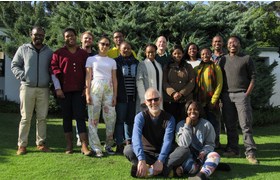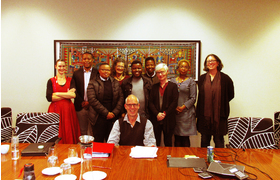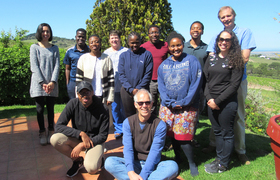Nastassja Koen: New nGAP member
22 October 2019 | Story Nastassja Koen. Photo David Emslie. Read time 4 min.
Nastassja joined nGAP in August 2019 having successfully applied for a Phase 5 position. She is a senior lecturer in the Department of Psychiatry and Mental Health. She is also deputy head of the Division of Psychopharmacology and Biological Psychiatry, and co-heads the Psychiatric Genetics Group in the UCT Neuroscience Institute.
A born-and-bred Capetonian, I completed my primary schooling at Star of the Sea School in St James, before attending Herschel Girls’ Senior School in Claremont. My mother is a retired English teacher and a 25+ year veteran of Kensington High School in Maitland. My father is a law professor at the University of the Western Cape (UWC), and I remember his writing up his PhD (some of it by hand!) when I was a young child. So I suppose an academic career was always on the cards for me!
I received generous bursary and scholarship support at Herschel Girls’; looking back, I have no doubt that this early investment paved the way for my career path. My parents have also been integral – despite both having taxing full-time jobs, they were really champions of my education, and were always on hand with advice, guidance and late-night homework assistance!
After matriculating, I completed an MBChB at UCT, graduating with honours. Early on in my studies, I found myself drawn to the academic aspects of medicine, particularly in psychiatry and mental health, which ultimately led me to pursue a PhD in this department at UCT. As a young and inexperienced doctoral student, the strong mentorship I received, particularly from my supervisor and HoD, Professor Dan Stein, was invaluable. The postgraduate journey can be shaped significantly by the degree of support, engagement and encouragement you receive from your supervisors and mentors, and I was very fortunate in this respect.
My PhD thesis focused on transgenerational traumatic stress and related disorders in a unique, multidisciplinary South African birth cohort study (the Drakenstein Child Health Study, PI: H Zar). I have been fortunate recently to secure my first collaborative NIH/H3Africa grant as a Multiple PI to expand this work in the Drakenstein study cohort. I am also currently a fellow in the Global Initiative for Neuropsychiatric Genetics Education in Research (GINGER) of the Harvard T.H. Chan School of Public Health and Broad Institute, within the Neuropsychiatric Genetics in African Populations (NeuroGAP) programme. Given the under-representation of populations of African ancestry in global genomics research, I am very excited to be involved in such work – both from a scientific perspective and from the perspective of global mental health and translational potential.
In my spare time, I enjoy hiking, running (I’m a very amateur half-marathoner) and occasionally revisiting my much-neglected piano. For me, family really is first. My parents, my partner, David, and our very large extended “clans” are a steadfast source of support as I navigate the – often choppy – waters of academia.
At this stage in my career, being involved in nGAP is a wonderful opportunity – not only in terms of my professional development, but also in terms of connecting with other “nGAPpers”, building my capacity as a future mentor, and contributing to UCT’s vision of transformation and academic excellence in Africa.
 This work is licensed under a Creative Commons Attribution-NoDerivatives 4.0 International License.
This work is licensed under a Creative Commons Attribution-NoDerivatives 4.0 International License.
Please view the republishing articles page for more information.
New Generation of Academics Programme (nGAP)
UCT has responded energetically to the New Generation of Academics Programme (nGAP), an opportunity provided by the Department of Higher Education (DHET) to build a new generation of black South African academics. The DHET’s 2015 vision document, “Staffing South Africa’s Universities Framework: A comprehensive, transformative approach to developing future generations of academics and building staff capacity”, proposes a suite of initiatives to address the challenge, with nGAP being the major instrument to increase the numbers of black South African academics.
The programme “involves the recruitment of highly capable scholars as new academics, against carefully designed and balanced equity considerations and in light of the disciplinary areas of greatest need”. The nGAP scholars are appointed into permanent positions where from the outset their conditions are customised to ensure their successful induction into the ranks of established academics.
The DHET provides funding over a six-year period to support the appointment of an nGAP lecturer, and their time is protected to provide the best possible opportunity for the completion of a doctorate degree in the shortest possible time. Once the degree is completed, the nGAP lecturer’s teaching commitments are steadily increased until they shoulder a full teaching load.
Since the first advertisement for nGAP posts in 2015, UCT has been awarded 17 nGAP positions: 5 (Phase 1), 4 (Phase 2), 3 (Phase 3) and 5 (Phase 4). These are distributed across all faculties.
UCT’s nGAP scholars operate as a single cohort, managed and coordinated by Dr Robert Morrell. Lecturers meet for quarterly meetings, writing retreats and various capacity-building activities all designed to support the completion of postgraduate qualifications (particularly doctorates) and to develop records of achievement that will testify to their emergence as self-standing, excellent academics. Each lecturer is mentored by a senior scholar, who provides support and guidance on the challenges that routinely face academics.
The nGAP manager sets great store in building the cohesion of the cohort and encouraging the establishment of new UCT networks while producing a collaborative, mutually supportive and embracing work culture.
According to Dr Morrell, “This group of academics will lead UCT in 15 to 20 years’ time ... Their vision of excellence, of being African and South African, of serving a wider community and producing knowledge for the planet, the continent and the country, will power UCT in years to come.”
Newsletters
In the news









































